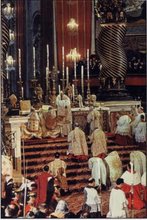
The above picture portrays the stereotypical German woman patriotically singing the German national anthem at a World Cup competition. What is different with this picture than in any other nation where its people express their love for their country? The fact that many Germans feel somehow dirty showing their love of their country. This becomes especially true when singing the national anthem, Das Deutschlandlied.
Das Deutschlandlied, or the Germany Song, was written by August Heinrich Hoffmann von Fallersleben in 1841 and put to the tune of the Gott erhalte Franz den Kaiser by Josef Hayden. Das Deutschlandlied became popular during the Imperial period in Germany, especially during the First World War; it was often sung by soldiers marching off to war. The opening lines Deutschland, Deutschland über alles, über alles in der Welt (Germany, Germany above all, above all in the world) has often been misinterpreted by non-Germans, and even by some Germans themselves. This is exacerbated by the Nazi Party's past use of Das Deutschlandlied. Even when the Nazis used the song, the Germans did not mean that Germany was above everything else in the world, but that the Germans placed their nation above other concerns, such as regional identification (i.e. Bavarians, Prussians, etc.).
While one can certainly understand why modern Germans are hesitant to sing their national anthem (which, by the way, consists of only the third stanza of Das Deutschlandlied), it is time for the Germans to start taking pride in their heritage, time for the Germans to be proud of what they have accomplished since their Nazi past (even though they have not yet restored the monarchy). Time to let those immortal words ring loud and clear. (Below I have embedded a video I found on YouTube of the anthem being sung against images from Germany).
(Note: This post has been renamed from its original title of "Nationalism in Germany" to better reflect my intent.)







5 comments:
I have been to Germany a couple of times, and noticed the very subdued sense of patriotism.
On one trip, I believe I only saw the German flag on a residence two or three times; in one instance, the German flag was flown alongside an American one.
On the other trip, I was speaking with a woman who said "I love Germany, but I don't think it is better than any other country."
Ah Germany, you have much to be proud of!
My experiences in Germany were much the same. I really didn't see many flags flying, mostly what I saw were Bavarian flags on homes and such. I actually had a hard time finding a German flag in the tourist shops. I was in Germany shortly after they beat America in the World Cup back in 2002. I asked around and apparently the shops sold out all their flags to natives who were all pumped up from the games. Too bad the only thing that seems to get the Germans proud of being German is soccer.
The rise of nationalism was one of the major causes of the decline of Catholic Christendom. One could argue that Protestantism is the religious aspect of nationalism.
Kind regards,
Perhaps I should have made the distinction between nationalism and patriotism (which is more of what I was speaking of). The Church has never condemned patriotism.
As Catholics, it's our job to sanctify what is good in the world (which means everything except sin). This includes German culture: if we allow Adolf Hitler and the Nazis to have so usurped German culture or German patriotism so that we believe that the two are interchangeable, that runs contrary to this mission, and we might as well have conceded the victory to them in World War II.
Post a Comment